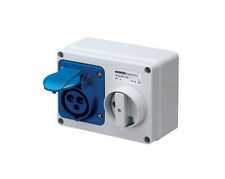Not at all (probably). But, you also do not have larger capacity.
kVA (kilo Volt-Ampere) is a measure of apparent power just like W (Watt). In fact, they are the same (W = VA) but when you read "W" this is a kind of theoretical figure which doesn't have too much in common with a real attached consumer whereas VA accounts for inductive losses and such, so it's much closer to a "real" device.
This has nothing to do with capacity (ampere hours) at all. Capacity is exactly the same.
Now, does it affect your power consumption? In theory, yes. While the battery is the same, the inverter is more powerful, so it operates somewhere in the lower range rather than somewhere in the upper range of its ability. Operating things (inverters, lightbulbs, motors, no matter what) in their upper range usually yields a greatly reduced lifetime, but best efficiency. Operating things (no matter what) in the low-mid range of their ability usually yields best lifetime but inferior efficiency.
In principle, this means that you are burning extra energy because your device is not operating in its best efficiency range.
In practice, as it happens, the load-efficiency curve on every no-shit inverter nowadays is ultra-steep. Anything at or above 20% you're pretty much at 90+%, and it doesn't get much better than that. Indeed, above approx. 80% the curve tends to go down again.
So, in practice, there's no real difference, but your UPS will probably last longer, just be happy.

40It'll increase your chiropractor bills... – Ignacio Vazquez-Abrams – 2018-02-26T04:24:55.087
@IgnacioVazquez-Abrams Sir, can you please elaborate? – Pragyaditya Das – 2018-02-26T04:27:54.963
18Larger power capacity means larger transformer. Larger transformer means more mass. More mass means more back pain when you try to lift it. – Ignacio Vazquez-Abrams – 2018-02-26T04:28:45.207
9@IgnacioVazquez-Abrams: I'm glad I wasn't drinking coffee in front of my monitor while reading this!! – user541686 – 2018-02-26T06:33:42.927
19@IgnacioVazquez-Abrams: Lift with your knees, and stop relying on alternative medicine. Your back pain will likely improve. – Lightness Races with Monica – 2018-02-26T11:54:33.993
Check the efficiency of the UPS, which depends on load. The UPS I have on a server adds between 50-100% to the power consumption, because it is not efficient at low loads... (Possibly a mistake in retrospect...) - IF the UPS is designed for the desired load, the effect should be fairly small. (Google "UPS efficiency" and you should find more information.) – DetlevCM – 2018-02-26T14:04:22.193
Sorry for the off, but how this UPS looks like? For real capacity it must have size, so I imagine it as an another washing mashine.... – uDev – 2018-02-26T15:01:25.307
3Is this a double conversion or off line UPS? – rackandboneman – 2018-02-26T20:57:59.957
How much power does the PC consume? Are you at at least 25% load? – derobert – 2018-02-28T17:59:20.227